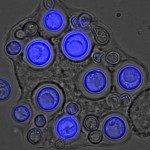Lien vers Pubmed [PMID] – 23510520
Med Sci (Paris) 2013 Mar;29 Spec No 1:13-8
Mucormycosis are deep infections caused by ubiquitous filamentous fungi of the order of Mucorales. The disease occurs mostly in immunocompromised, diabetic or solid organ transplant recipients. There are currently no specific diagnostic guidelines for mucormycosis. The histological examination and culture of the clinical sample remain the most useful approaches for diagnosis. Furthermore, alternative methods to the fungal culture are yet to be standardized. Here we review the current microbiological approaches used for the diagnosis and identification of Mucorales.
